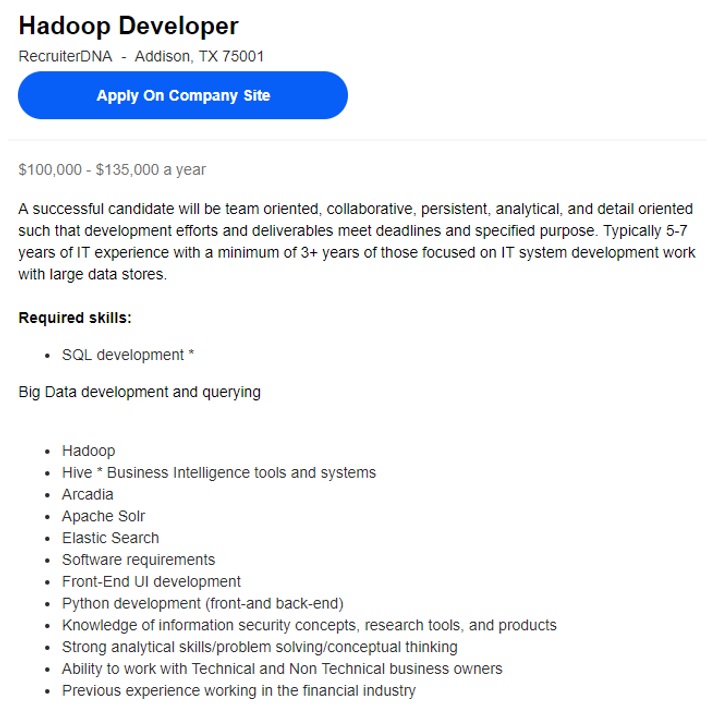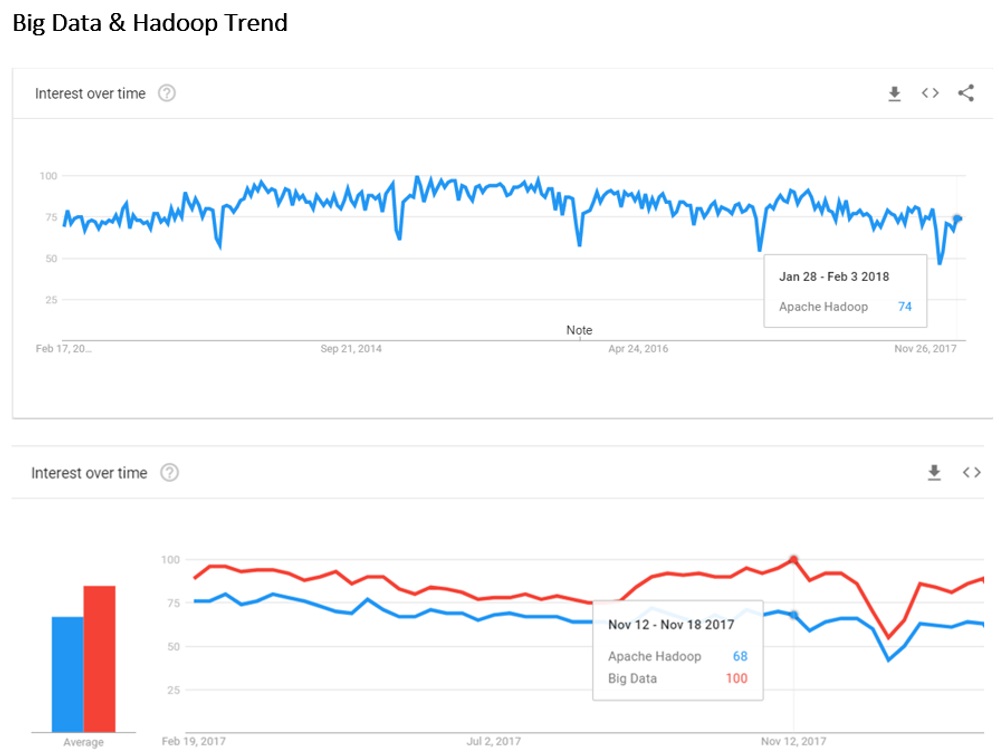How to Become a Successful Big Data Hadoop Developer
Any company that experiences a massive influx of data knows that traditional methods of processing normal amounts of data cannot handle the kinds of volumes that big data is known for. Hadoop, an open-source framework that works across several servers to store, manage and distribute large volumes of data, is one of the solutions to this problem.
The HDFS (Hadoop Distributed File System) breaks down large files into small blocks of a specified size (default size per block is 128mb) and distributes them across different nodes.

A big data Hadoop developer, therefore, is a software development professional who understands the challenges of big data and can leverage data systems and architecture such as Hadoop, to solve these challenges and make the system efficient.
Why you should become a big data Hadoop developer

Opportunities in Hadoop are rife, and the jobs are rewarding. As seen in the example above from indeed.com, a professional Hadoop Developer can expect an average salary of $100,000 per annum. The question that begs therefore is, “is this lucrative profession here to stay?”
Hadoop is here to stay, and its adoption is skyrocketing. To support this sentiment, Vamsi K. Chemitiganti general Manager at Hortonworks, a provider of Hadoop, points out that Hortonworks, a tech startup, reached $100 million in annual revenue faster than any other startups in the technology space. He also notes that most large enterprises have started deploying Hadoop. Forecasts from Forbes show that by 2011, Hadoop will reach $99.31B.
Since its adoption, Hadoop has acquired a reputation for being scalable, making it a reliable platform for storing and processing data. Not only does adopting Hadoop make dealing with big data cost -effective, but its ease of integration with analytics software like Spark makes it an ideal tool for handling a large variety of workloads. As such, Hadoop is invaluable to enterprises in verticals such as insurance, banking, manufacturing, telecom, and online retail, that generate and use big data. The health sector, for instance, experiences a lot of information flow from Electronic Medical Records, wearables, and medical equipment, among others. Hadoop allows such institutions to store, map and process all this data and leverage it in decisions involving cure and treatment, all at a manageable cost.
This, in turn, has created high demand for Hadoop developers.

Google trends show that Hadoop has had stable growth over the last 5 years. It is also worth noting that at the same time, big data has experienced a similar trend, prompting the argument that both big data and Hadoop have a bright future.
The roles and responsibilities of a big data Hadoop developer
Big data Hadoop developers are basically software programmers, and they only code solutions for big data Hadoop. A typical work routine for a big data Hadoop developer involves the following:
- Creating and implementing Hadoop solutions
- Working with SQL and NoSQL
- Knowledge of data warehousing
- Hadoop configuration and support
- Designing web solutions for high-speed tracking and querying of data
- Complete understanding of Hadoop and how to work within its ecosystem
- Creating code with MapReduce
- Managing and monitoring log files
- Building Hadoop clusters
- Using Pig and Hive to preprocess data
- Analyzing large sets of data to uncover insights
- Protecting the integrity, security, and privacy of data
- Data loading
- HBase deployment and management
Responsibilities will differ depending on the sector or domain you work in.
What skills do you need to become a big data Hadoop developer?
To effectively perform the responsibilities above, you should have the following skills:
- Proficiency in Hadoop
- Write reliable code in Python or Scala
- Experience with Pig, Hive, and HBase
- Know how to write MapReduce jobs and how to use PigLatin to write scripts
- Understand data loading and tools used in the process, like Sqoop and Flume
- Be an analytical thinker and a problem solver
- Proficiency in back-end programming with java, OOAD, Node.js, and JS.
- Understand database structures
- Skillful in concurrency and multi-threading concepts
- Understand workflows and schedules
If you are facing challenges of handling big data, relevant training as a Big data Hadoop developer will equip you with these skills. With these skills, you will improve your prospects in the job market if you are a fresh graduate.
Recommended courses for Big Data Hadoop Developer Training
SimpliLearn’s Big Data Hadoop Certification Training
With self-paced videos, instructor-led training, and hands-on projects, this course will make you ready to sit for Cloudera’s CCA175 big data certification exams. This course will teach you the following:
- The Hadoop Framework and how to deploy Hadoop in a cluster environment
- Components such as Hive, Pig and Impala and how to use them to process data sets in HDFS
- Spark algorithms, query processes using Spark SQL,
- Parallel processing and data processing in real time using Spark
- execute real-life projects with CloudLab
- Working with HDFS to store and manage data
- Characteristics and advanced concepts of MapReduce
- Data ingestion with Flume and Sqoop
- Using Hive and Impala to partition and create tables and databases
- Working with HBase
This course, as with all other SimpliLearn courses, comes with a money back guarantee.
Certification: yes
Cost: $ 399
EdX Big data Fundamentals Training Course
This course will introduce you to the world of Big Data. You will learn how Big Data is driving organizational change. You will also learn about:
- MapReduce and its applications
- Fundamental techniques, such as data mining and stream processing
- Designing algorithms for stream processing
- A complete overview of the PageRank algorithm
- the underlying random walk algorithms
Coursera’s Hadoop Platform and Application Framework
Offered by UC San Diego, this course is for beginner-level programmers and other professionals who want to understand how to analyze big data.
The course is self-paced and only takes 5 weeks if you put in 1 to 2 hours of study every week. It will fit in your schedule if you are busy or need more time to understand complex areas. The individual modules will cover:
- Insights into the challenges posed by big data
- The components and basics of Hadoop ecosystem, its software stack and the execution environment.
- The design of Hadoop Distributed File System (HDFS), its read/write processes and configurations for improving performance.
- How to access data with HDFS
- Understand the idea behind MapReduce, execute tasks in MapReduce and learn its trade-offs
- Get introduced to the Spark framework and its characteristics and learn how it compares to MapReduce
- To gain practical experience, you will be immersed in solving real-world data problems with Spark and Hadoop.
Though you will begin with no experience at all, the course guarantees that by the time you finish the curriculum, you will speak about Hadoop and big data with authority.
Certification: yes
Cost: Available upon enrolling
Cloudera Developer Training for Apache Spark and Hadoop
and Hadoop
If you are a Python or Scala developer, this course will teach you concepts of big data processing and prepare you to become an expert in dealing with big data problems. Although you don’t need to have prior experience with Spark or Hadoop, you need to know programming with Python or Scala to take this course. You also need to know SQL and be familiar with the Linux command line.
You will learn:
- How to use Apache Spark 2 to develop parallel applications.
- How to write and execute Spark applications on clusters
- Data storage and processing in a cluster
- Data querying and processing with Spark SQL
- Process streaming data from multiple sources with Spark Streaming
- How to write applications that will accomplish ETL processing with core Spark
You will also gain hands-on experience by practicing on live clusters in the cloud.
With your new skills, you will be able to improve the speed and quality of analysis and decisions in any industry and use case.
Certification: yes
Cost: Available upon enrolling
Conclusion
From the above, we can conclude that as long as companies continue to generate a lot of data, big data will continue to be relevant and along with it, applications like Hadoop that make data processing easy.
As such, as a big data Hadoop developer, you will continue to be pertinent to the processes involved in helping organizations use their data to solve business challenges. Whether it’s fraud detection, selling more products, managing risk, or breaking into new markets, as long as data is involved, you will be at the center of it all. Considering you only need a few hundred dollars and 1 to 2 hours a week to get on a path to earning 6-figure income, the investment is worth your while.
Read Full Article Here - How to Become a Successful Big Data Hadoop Developer
from TechGYD.COM https://ift.tt/2GDRPqM
Labels: TechGYD.COM
0 Comments:
Post a Comment
Subscribe to Post Comments [Atom]
<< Home